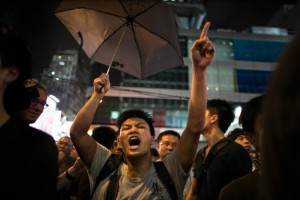ZHANG XIAORAN 10.03.14
A pro-democracy protester yells out in Hong Kong’s Mongkok neighborhood, October 3, 2014. Thousands of pro-democracy supporters continue to occupy the streets of Hong Kong’s financial district.
“Dozens of mainlanders were taken away by the police because they openly supported Occupy Central and at least ten of them have been detained…They are in Jiangxi, Shanghai, Shenzhen, Beijing, Chongqing, Guangzhou, etc,” Hong Kong-based blogger and journalist Annie Zhang posted on her Facebook page on October 1, the 65th National Day of the People’s Republic.
The day before, Occupy Central supporters took to the streets to demand greater democracy and autonomy for their city. All of the world watched. All the world, that is, except mainland China, which was in the middle of its “most censored day of the year.” Reporter @朱学东 captured the disconnect in a microblog post from inside the Great Firewall: “the distance from Taiping Shan in Hong Kong to Beijing is only 1,976 km (1,227 miles), but who knows the distance between people’s hearts?”
In the days since, mainlanders have looked for ways to speak their minds online. Mainland students and alumni of Hong Kong’s universities added their support for the pro-democracy protestors by setting up a Facebook page. Sina Weibo, the massive (and heavily censored) microblogging platform, has quickly become a battleground for free speech about Hong Kong, its users deploying ever-more subtle tactics to keep their opinions from being deleted by mainland censors.
Some drew on history to signal their hope that China’s leaders would deal with the Hong Kong protesters with leniency. Microblogger @张修林微博 referenced the pro-democracy protests in Taiwan in 1979: “When the leaders of the movement were arrested, the army called for the death penalty, to make examples of the disobedient protesters. The then-chancellor of National Tsing Hua University, Shen Junshan, warned Kuomintang leader Chiang Ching-kuo that “once the blood touched the ground, it could never be taken back.” Chiang fell silent but heeded Shen’s advice and didn’t kill a single protestor.
Many mainlanders questioned the protests on the grounds that they could damage Hong Kong’s economy. Influential liberal and outspoken microblogger @李宇晖_Huey, a Ph.D. student in Chinese politics, dismissed the criticism with a reference to World War II: “That’s bullshit! The anti-Japanese War also had a devastating effect on Chinese economy!” he wrote.
For detail please visit here

